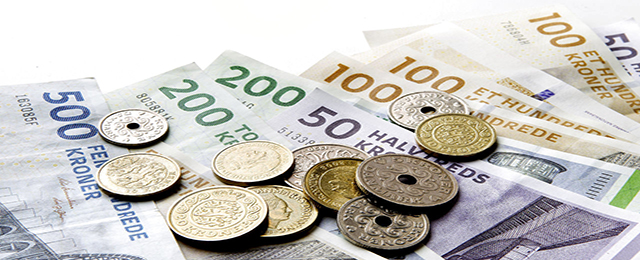Switzerland is famous as a secure destination for money, a so-called safe heaven. A couple of weeks ago the country got even more attention in the financial markets after the central bank had to let the Swiss franc float free again. This explosion immediately put attention on Denmark, an even smaller country with a population of only 5.4 million people. Denmark has an AAA credit rating and is extremely stable. It belongs to one of the oldest kingdoms in the world, celebrating its 1,080th year as monarchy this year. Stability is what characterizes a safe heaven, which Denmark has become among international investors. One could say it’s an honorable status, but it causes big problems in the Danish financial market, and some speculate the Danish krone is the next currency to explode.
The krone is pegged to the euro with a fluctuation limit of 0.25 percent either way. This eliminates the currency risk for international investors who use Denmark as a safe heaven. Furthermore, Denmark has a huge domestic mortgage bond market where most bonds are rated AAA and very liquid. All in all, this is exactly what international investors want in a parking spot for their money. But as in Switzerland, the Danish central bank is fighting with an enormous inflow of money.
Since mid-2012, the central bank rate for deposits has been negative, just like in Switzerland. From April to August, the Danish central bank managed to get the rate up to 0.05 percent. Afterward, it dipped below zero again, and Denmark was recently forced to cut the interest rate twice. It’s a new low, at minus 0.35 percent, though somewhat far away from Switzerland’s record of minus 0.75 percent. However, it leads to growing speculation as to whether Denmark will have to give up the peg with the euro.
When one starts to analyze the macroeconomic conditions, the similarities between Switzerland and Denmark largely fade away. Both countries have a surplus on the balance of trade, but when it comes to the domestic fiscal situation, Denmark is much less healthy. The Swiss government typically runs a fiscal budget surplus and has reduced the level of government debt to 35 percent of GDP. It leaves fiscal maneuver room to stimulate the economy if exports are hurt too much by the exploding Swiss franc.
Denmark has run a budget deficit for years. This is an election year for the Danish parliament, which means the ruling government has increased public spending to the outer limit. Most likely the 3 percent deficit limit, decided by European Union, will be breached. Furthermore, total government debt is moving fast toward the limit as well, the where EU says the maximum is 60 percent of GDP, though this is still much better than in many other EU countries. Denmark already has the highest income tax in the world and, on a relative basis, the biggest and most expensive public sector. The consequence is that the government does not have any way to support the economy further. This is a significant reason why Denmark cannot give up the euro peg.
If the Danish krone was suddenly free floating and capital inflows continued, then it would naturally jump in value. This would torch Danish exporters and send the economy back into recession. Further, for years Denmark has been among the EU countries with the weakest growth. This fact also underlines the very static situation the Danish economy is facing. The most positive impulse ironically is the peg to the euro. Against all major currencies, the euro is dropping. This means the Danish krone is following the euro down, helping Danish exports and the economy. Denmark will not let its currency explode like Switzerland did. The result is very static economic development that largely depends on growth in the rest of Europe and the United States. This will continue for a long time, which makes it hard to imagine that Denmark’s central bank can return to positive short-term rates any soon.
*Peter Lundgreen is the CEO and founder of Lundgreen’s Capital, an investment consulting and advisory company






Capitalism is a crime.